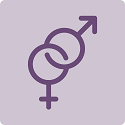 How does sex relate to cardiovascular disease?
How does sex relate to cardiovascular disease?
Overall, men have a higher risk for heart attack than women, but the difference narrows after women reach menopause. This is a result of a drop in estrogen levels, increasing the risk for women until it matches that of men.
- Cardiovascular risk increases significantly among women after the age of 65.
- Younger women who have diabetes are at the same risk for heart disease as men their age.
- Overall, women are more likely to die following a heart attack than men.
Sex-specific risk factors
Pregnancy
Evidence is growing that pregnancy may be considered a "stress test" for future risk of heart disease, with different complications being linked to important risk factors later in life. Women who have had blood pressure disorders in pregnancy, such as gestational hypertension and pre-eclampsia, have been shown to have greater risk of developing hypertension and heart disease years later. Complications with blood sugar levels during pregnancy, such as gestational diabetes, have also been linked to the development of diabetes in relatively young women.
Hormone-related conditions
Women with hormonal imbalances such as polycystic ovary syndrome (PCOS) are at greater risk of having diabetes, high blood pressure and heart attacks than women without PCOS. Women who experience premature ovarian failure have lower levels of estrogen and an increased risk of developing heart disease after age 55.
Menopause
Women younger than 55 have a lower risk of heart disease than men the same age, but this gap narrows dramatically as women age. After menopause, women begin to develop more risk factors for heart disease, such as high blood pressure, weight gain, and diabetes. The exact cause isn’t known, but the effect is undeniable: cardiovascular disease is the leading cause of death in women over the age of 65.
Click here for more in-depth information about cardiovascular conditions and risk factors that only or more predominantly affect women. Learn more about Women & Heart Disease on the University of Ottawa Heart Institute website.
What You Can Do...
- If you experience symptoms, visit a doctor. When in doubt….check it out!
- Getting ready for an upcoming appointment? Click here for tips on talking with your health care provider. Click here for questions to ask your health care provider about cardiovascular disease.

